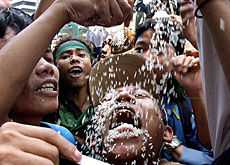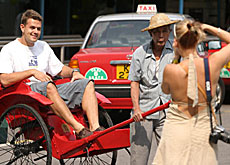Shoppers urged to buy fair-trade rice

Swiss consumers are being asked to support rice farmers in developing countries, as part of worldwide efforts to celebrate the United Nations International Year of Rice.
Campaigners called on shoppers to buy fair-trade rice during a ceremony in Basel to launch the event in Switzerland.
The Swiss eat a mere six kilograms of rice per person per year compared with between 150-200 kilograms in countries like Myanmar, Laos, Vietnam and Bangladesh.
But if the population switched to fair-trade rice, campaigners say it could help thousands of farmers in developing countries enjoy a better life.
“Everybody can do something,” Guido Münzel, spokesman for Claro Fair Trade, told swissinfo.
Staple food
Rice is the staple food for more than half of the world’s population. About 80 per cent of global production is grown by small-scale farmers in developing countries where the crop provides an essential source of income.
The UN sees the year-long campaign as one way of achieving the Millennium Development Goals, which call for a 50 per cent reduction of hunger and poverty by 2015.
Among those taking up the UN’s “Rice is Life” slogan were David Syz, director of the State Secretariat for Economic Affairs (Seco), Claro’s president, Anne-Marie Holenstein, and analyst Devinder Sharma from the Forum for Biotechnology and Food Security in New Delhi, India.
Seco, which is trying to improve market access for developing countries, emphasised the importance of rice within the framework of free trade.
“Our aim is to reduce poverty in development and transition countries,” explained spokesman Christian Hofer.
“To achieve that goal, we are trying to integrate them in the world economy. Fair trade is a concept which is part of free trade, so it’s not a contradiction that we are supporting it.”
Better prices
Claro, which is based near Biel in canton Bern, is working to improve the lives of the world’s disadvantaged small-scale producers.
Its guiding principles are: that its partners receive a price that ensures an adequate livelihood; that they enjoy a minimum standard of social protection; and that production is environmentally friendly.
Wherever possible it buys its goods directly from the producers or their export organisations and tries to have them processed and packaged locally.
In Thailand, Claro works with a non-governmental organisation called Green Net, based in Bangkok. Green Net markets mainly Hom Mali rice – the aromatic jasmine rice.
Cultural value
Jasmine rice makes up about a quarter of total Thai rice exports but it brings in more money than other strains because of its high price on the world market.
In Switzerland, Green Net Hom Mali sells for SFr2.20 ($1.80) to SFr6 a kilogram. That’s about 50 per cent more than jasmine rice which doesn’t carry the fair-trade label.
The extra money pays for health provision and further education for farmers’ families.
Fair-trade products can be bought in the 150 Claro stores in German-speaking Switzerland or in other shops displaying goods with the Max Havelaar label.
The UN year of rice is not only concentrating on fair trade. Other key topics are the importance of rice fields for biodiversity and the central role that rice plays in many cultures with festivals, rituals, celebrations and recipes centred on the crop.
swissinfo, Vincent Landon
There are thousands of varieties of rice grown throughout the world.
Annual production is about 400 million tons a year.
Developing countries account for about 95 per cent of this total. China and India are responsible for more than half of global output.
Brazil is the most important non-Asian producer, followed by the United States.
Italy ranks first in Europe.
Rice is grown on all the continents of the world except Antarctica.
It is the staple food for more than half of the world’s population.
Almost a billion households in Asia, Africa and the Americas depend on rice for their main source of employment and livelihood.
Small-scale farmers in developing countries produce about four-fifths of the world’s rice.
The UN says rice is on the frontline in the fight against world hunger and poverty.

In compliance with the JTI standards
More: SWI swissinfo.ch certified by the Journalism Trust Initiative











You can find an overview of ongoing debates with our journalists here . Please join us!
If you want to start a conversation about a topic raised in this article or want to report factual errors, email us at english@swissinfo.ch.